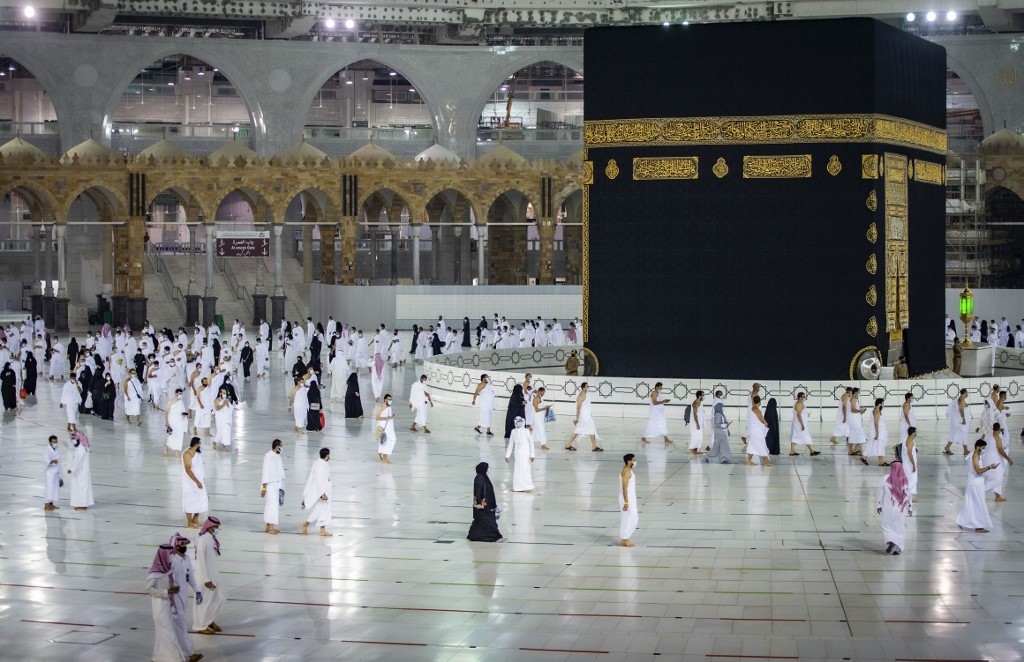Coronavirus: Saudi Arabia allows 'limited' number of pilgrims to perform Umrah

Wearing masks and walking along socially distanced paths, thousands of pilgrims entered the Grand Mosque in Mecca on Sunday to perform Umrah for the first time in seven months, after Saudi Arabia relaxed coronavirus-related restrictions.
Entering the Grand Mosque in small batches of 20 to 25 people, the pilgrims were allowed to do Umrah, a pilgrimage to the cities of Mecca and Medina that can be done at any time throughout the year.
New MEE newsletter: Jerusalem Dispatch
Sign up to get the latest insights and analysis on Israel-Palestine, alongside Turkey Unpacked and other MEE newsletters
"It's a special feeling that the holy site has opened its doors again," said Egyptian pilgrim Mohammed Raafat.
"We lived through a sad nightmare of not seeing the holy site for months."
The Umrah has historically attracted millions of pilgrims from around the world, but because of Covid-19 the Saudi authorities have said they would phase in the number of pilgrims allowed into Mecca and Medina.
Saudi Hajj Minister Muhammad Benten last week said that 6,000 pilgrims would be allowed each day in the first stage to perform the Umrah during a specific time period.
The pilgrims would be comprised of a mixture of Saudi nationals and permanent residents of the country who gained the chance to perform the Umrah after signing up online.
But despite allowing pilgrims to come back, a range of restrictions had been put in place to prevent the spread of the coronavirus.
Groups will be accompanied by a health worker, and medical teams would be present in case of an emergency.
Other restrictions included banning pilgrims from touching the Kaabah, the cubic structure Muslims pray towards five times a day.
Pilgrims to be allowed back in stages
Under the second stage of the plan, Saudi Arabia hoped to increase the number of Umrah pilgrims to 15,000 per day, starting on 18 October.
Visitors from abroad would be permitted in the third stage from 1 November, when capacity would be raised to 20,000.
A maximum of 40,000 people, including other worshippers, would be allowed to perform prayers at the Grand Mosque in the second stage and 60,000 in the third, according to the Interior Ministry.
The ministry said that it would review the situation and determine whether the Umrah pilgrimage would resume to full capacity once the threat of the coronavirus was averted.
Riyadh said that until then the health ministry would vet which countries would be permitted to send pilgrims.
The kingdom initially imposed a blanket ban on the Umrah pilgrimages to the holy cities of Mecca and Medina in March due to the coronavirus pandemic.
The country has recorded more than 330,000 cases of the novel virus, including more than 4,500 deaths.
Despite banning Umrah, Riyadh maintained the annual Hajj pilgrimage, but allowed only around 1,000 pilgrims residing in the kingdom to perform it, due to concerns over the spread of the virus.
While Hajj is a mandatory pilgrimage, taken at a specific time of the year, for all Muslims who are physically and financially able to make the journey, Umrah can be undertaken at any time of the year and is not considered compulsory.
The kingdom, which hosts the two holiest sites of Islam, welcomes millions of Muslim visitors throughout the year with a peak for the Hajj pilgrimage.
Nearly seven million people visit Mecca annually to perform Umrah. Prior to visiting Saudi Arabia, pilgrims are required to provide certificates for vaccinations in their visa applications.
Middle East Eye delivers independent and unrivalled coverage and analysis of the Middle East, North Africa and beyond. To learn more about republishing this content and the associated fees, please fill out this form. More about MEE can be found here.






